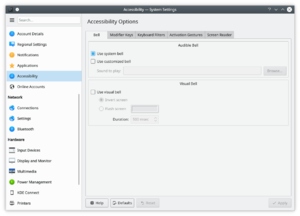System Settings/Accessibility/en: Difference between revisions
(Updating to match new version of source page) |
(Updating to match new version of source page) |
||
| Line 9: | Line 9: | ||
{{PreferenceHelp}} | {{PreferenceHelp}} | ||
KDE contains accessibility settings for you in order to make your experience easier when using a computer. | |||
{{Info|1=If you have desktop effects activated, you will find some options that may also be of interest in the [[Special:myLanguage/System Settings/Desktop Effects|Desktop Effects]] module of '''System Settings'''.}} | {{Info|1=If you have desktop effects activated, you will find some options that may also be of interest in the [[Special:myLanguage/System Settings/Desktop Effects|Desktop Effects]] module of '''System Settings'''.}} | ||
Revision as of 20:01, 17 January 2012
 |
Settings to improve the desktop experience for disabled persons |

Information
If you know something about these preferences then please help us by adding information. Don't worry about formatting. We will help you ensure that your text is properly formatted.
KDE contains accessibility settings for you in order to make your experience easier when using a computer.

Information
If you have desktop effects activated, you will find some options that may also be of interest in the Desktop Effects module of System Settings.
In the tab you can customize the system bell. You can also have it display a visual clue. If you find these settings useful, you may also want to have a look at the Application and System Notifications module of System Settings.
If you find it difficult to use the keyboard, the and tabs has options that you may find helpful; and the has options to use mouse gestures to activate sticky keys or slow keys, if you do not want to use these features all the time.
Even simple settings like slowing the rate of keyboard repeat can be a great help
